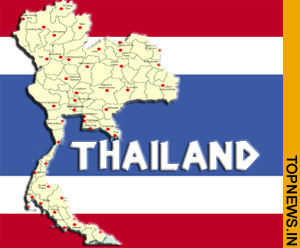Thailand opens joint parliamentary session on protests Eds: epa photos available
 Bangkok - Thai Prime Minister Abhisit Vejjajiva maintained Wednesday that his government had acted with restraint and transparency in last week's crackdown on violent protests in Bangkok that left two people dead and 123 injured.
Bangkok - Thai Prime Minister Abhisit Vejjajiva maintained Wednesday that his government had acted with restraint and transparency in last week's crackdown on violent protests in Bangkok that left two people dead and 123 injured.
"Only two people died, and six were injured by bullets, including two soldiers and four civilians," Abhisit told a joint session of the upper and lower houses of parliament.
The two known casualties have been blamed on the followers of the United Front for Democracy against Dictatorship (UDD), the movement that has held regular protests against Abhisit's 4-month-old government and called for its dissolution.
The UDD supports the return to power of Thaksin Shinawatra, a former billionaire telecommunications tycoon who was prime minister from 2001-06.
The special joint session of parliament was being held Wednesday and Thursday to discuss the cabinet's handling of the anti-government protests on April 11-14 that culminated in the humiliating cancellation of a regional summit Thailand was hosting, and the enforcement of emergency law to restore order in Bangkok.
While Abhisit and the army have been widely commended for using restraint in quelling the demonstrations, which turned violent on April 13 when protestors blocked streets, burned 20 public buses and threatened to ignite gas trucks, the UDD and its backers insisted the casualties have been understated.
The Puea Thai opposition party claimed it would use the joint session to present evidence that protestors died in the crackdown despite government denials.
To date, their claims of unreported deaths have been discredited although Abhisit has vowed to investigate any new evidence.
"I sincerely believe that most of the protestors were innocent, and only a few core leaders turned a peaceful demonstration into a violent one," Abhisit said.
The government has arrested at least 34 protest leaders, 23 of whom were released on bail Tuesday, and issued arrest warrants for more than a dozen others, including Thaksin, on charges of inciting the unrest.
The swift arrests were criticized by the UDD and opposition, who accused Abhisit's government of double standards in enforcing the law.
The leaders of the UDD's rival, the People's Alliance for Democracy (PAD), the movement that last year closed down Bangkok's two airports, have yet to be sentenced for damage they did to the country.
The Democrat party, which Abhisit leads, was supportive of the PAD movement last year when it was in the opposition.
Thailand has been deeply divided since 2006 when its society split into camps opposed to and in favour of Thaksin, a former police official whose populist policies won him a huge following among some sectors of the rural and urban poor.
Although he came to power through democratic elections, Thaksin's increasingly autocratic and self-serving rule eventually antagonized the Thai middle class and the established political elite - the pro-monarchy aristocracy, the military and the bureaucracy.
A coup toppled Thaksin in September 2006, but he has remained a central player in Thai politics for the past three years.
Operating out of Dubai after being convicted of abuse of power and skipping bail, Thaksin was regularly phoning in encouragement to the UDD during its protests and at one point called for a "people's revolution."
Although Abhisit's government succeeded in quelling the protestors last week, opposition to his rule was expected to continue.
"When the government ignores the people, they have to find a way of getting the country reformed," said Jakrapob Penkair, one of the UDD leaders who escaped arrest last week and is organizing anti-government activities from outside the country.
"Protests will go on, but they are not the only means to get what we want," Jakrapob said. (dpa)